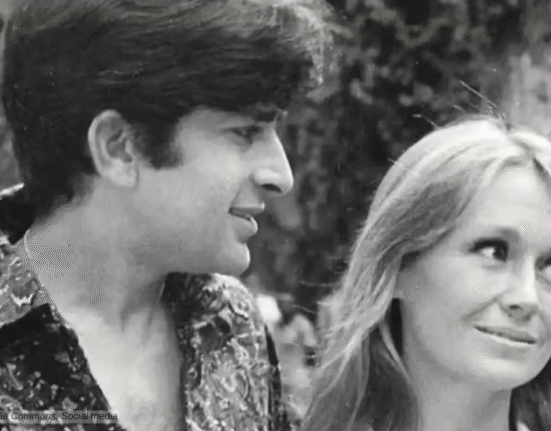Elvis of India, Rockstar, Yahoo Boy, Dynamic, Dashing, Charismatic, or we can simply say, Shammi Kapoor, was one of the most beloved stars of Indian cinema. He is known for his charming personality and films like Tumsa Nahi Dekha, Dil Deke Dekho, Junglee, China Town, Rajkumar, Kashmir Ki Kali, Teesri Manzil, An Evening in Paris, Brahmachari, and Prince.
Early Life
Shammi Kapoor, born Shamsher Raj Kapoor on October 21, 1931, was a prominent figure in the Indian film industry. Shammi made his special place with his charismatic screen presence and energetic dance moves. His career spanned over five decades, during which he appeared in over 100 films.
Shammi was born into the prestigious Kapoor family as the second son of Prithviraj Kapoor, a pioneer of Indian theatre and cinema, and Ramsarni Mehra Kapoor. Shammi’s brothers Raj Kapoor and Shashi Kapoor were also successful actors, making the Kapoors synonymous with Bollywood royalty.
Entry Into Films

Shammi made his acting debut in 1953 with Mahesh Kaul’s “Jeewan Jyoti,” opposite Chand Usmani. He followed it with films such as Rail Ka Dibba (1953) and Naqab (1955) with Madhubala, with Nutan in Laila Majnu (1953) with Nutan, Thokar (1953), Gul Sanobar (1953), Chor Bazar (1954), and Mirza Sahiban (1957) opposite Shyama, Mehbooba (1954), Hum Sab Chor Hain (1956) with Nalini Jaywant, Shama Parwana (1954) with Suraiya, and Mem Sahib (1956) with Meena Kumari. Unfortunately, most of these films tanked at the box office.
After a series of box-office flops, Shammi Kapoor’s breakthrough came with Nasir Hussain’s “Tumsa Nahin Dekha,” opposite Ameeta, in 1957, which established him as a stylish playboy and a talented dancer. He again collaborated with Nassir Hussain on the 1959 blockbuster “Dil Deke Dekho” with Asha Parekh. With these films, Shammi Kapoor established himself as a dynamic force at the box office, especially for musical comedies and thrillers. His antics and dance were superbly complimented with Rafi Saab’s voice, and the duo became one of the most successful actor-singer pairs in Hindi cinema.
The Rockstar – Shammi Kapoor
His subsequent films, including College Girl (1960), Junglee (1961), Dil Tera Deewana (1962), Professor (1962), China Town (1962), Shahid Bhagat Singh (1963), Bluff Master (1963), Rajkumar (1964), Kashmir Ki Kali (1965), and Janwar (1964), further cemented his reputation as a leading man with a flair for romantic and comedic roles.
Shammi’s flamboyant style and exuberant dance moves earned him the nickname “Elvis Presley of India.” He was one of the first Indian actors to bring rock and roll to Bollywood’s silver screen, and his performances in songs like “Yahoo! Chahe Koi Mujhe Junglee Kahe” became iconic.
In 1966, he again collaborated with Nassir Hussain and Asha Parekh in “Teesri Manzil,” which is considered one of the finest musical mystries of Hindi cinema. The film has famous songs like “O Haseena Zulfonwale Jane Jahan,” “Aaja Aaja Main Hoon Pyar Tera,” “Deewana Mujhsa Nahin,” and “Tumne Mujhe Dekha Hokar Meherban.”

In the late 1960s, he starred in many successful films like Budtameez (1966) with Sadhana, An Evening in Paris (1966) with Sharmila Tagore, Brahmachari (1968) with Rajshree and Mumtaz, Prince (1969) with Vyjayanthimala, Tumse Achha Kaun Hai (1969) with Babita, Sachaai (1969) with Sadhana, and Pagla Kahin Ka (1970) with Asha Parekh.
Transition of Shammi Kapoor
In the 1970s, Shammi Kapoor started to struggle with his weight. It was due to his genetics as well as many injuries he suffered during the course of his career. In 1971, he starred in Jawan Muhabat, Jane Anjane, Preetam, and the superhit “Andaz,” with Rajesh Khanna and Hema Malini. His last film as a lead was “Chhote Sarkar,” opposite Sadhna, which came in 1974.
The same year he made his directorial debut with “Manoranjan (1974),” followed by “Bundelbaaz (1976).” In 1974, he acted as the father of “Saira Banu in “Zameer,” starring Amitabh Bachchan. As a character actor he went on to do films like Parvarish (1977), Mama Bhanja (1977), Shalimar (1978), Meera (1979), Ahista Ahista (1981), Desh Premee (1982), Prem Rog (1982), Vidhaata (1982), Betaab (1983), Hero (1983), Sohni Mahiwal (1984), Wanted (1984), Allah Rakha (1988), Ijaazat (1987), Hukumat (1987), Daata (1989), Batwara (1989), and many more.


Later Careeer
In the 1990s Kapoor cut off his work and apeared in seletive roles. In 1991 he had a cameo in his brother Shashi Kapoor’s film Ajooba. He also acted in other RK films Prem Granth (1996), and Aur Pyar Ho Gaya (1997). Some of his other notable films include Tahalka (1992), Chamatkar (1992), Heer Ranjha (1992), and Gardish (1993), among others. His final film appearance was “Rockstar” (2011).
Throughout his illustrious career, Shammi Kapoor received numerous accolades, including three Filmfare Awards. He won the Best Actor award for “Brahmachari” (1968) and the Best Supporting Actor award for “Vidhaata” (1982).
Personal Life
In 1955, Kapoor met and fell in love with actress Geeta Bali during the film “Miss Coca-Cola.” Their relationship gets strong while shooting “Rangeen Raaten,” and they married four months later at Banganga Temple in Mumbai. The couple had a son, Aditya Raj Kapoor, in 1956 and a daughter, Kanchan Kapoor, in 1961. Tragically, Geeta Bali passed away in 1965 due to smallpox. Four years later, Kapoor married Neila Devi Gohil of the Gohil dynasty in 1969.
Shammi Kapoor passed away on August 14, 2011. His legacy lives on through his films and the vibrant energy he brought to the screen. In 2016 Rauf Ahmad published his biography, “Shammi Kapoor: The Game Changer.”
Shammi Kapoor’s journey from a struggling actor to a beloved superstar is proof of his talent, hard work, and enduring appeal. He is remembered as a trailblazer who redefined the image of the Hindi film hero and inspired generations of actors and dancers.
Shammi Kapoor on IMDB









